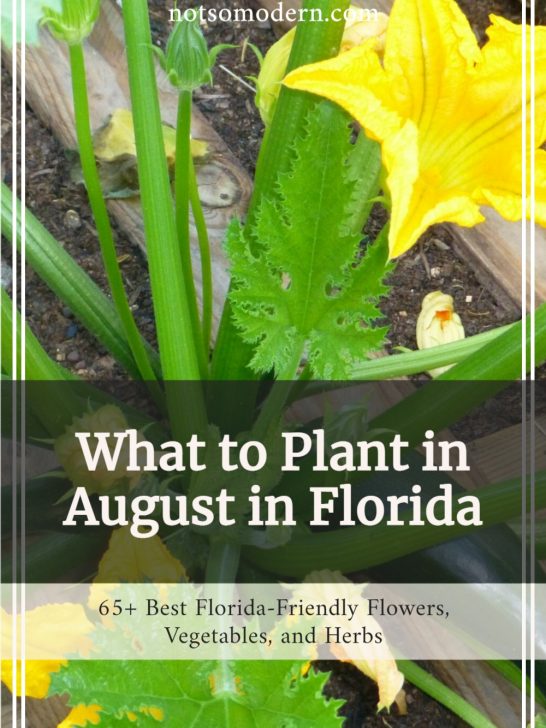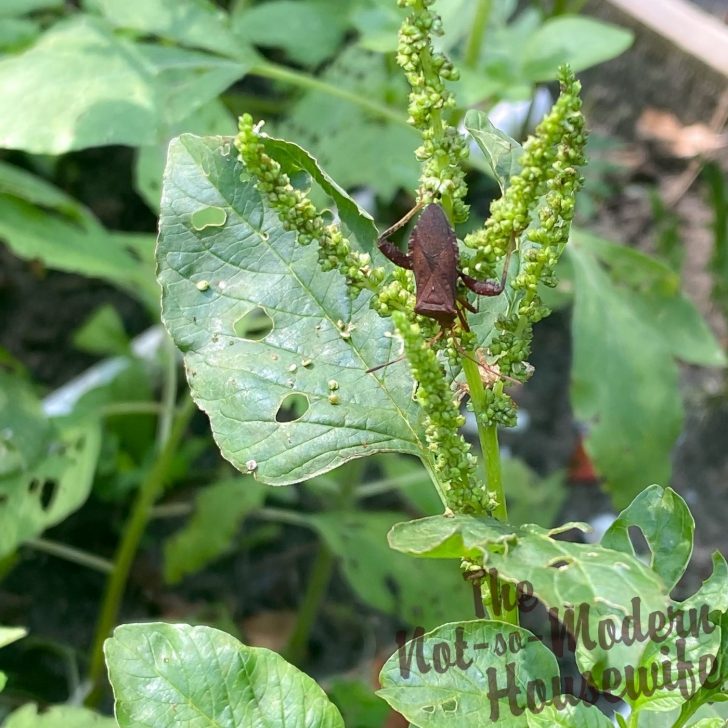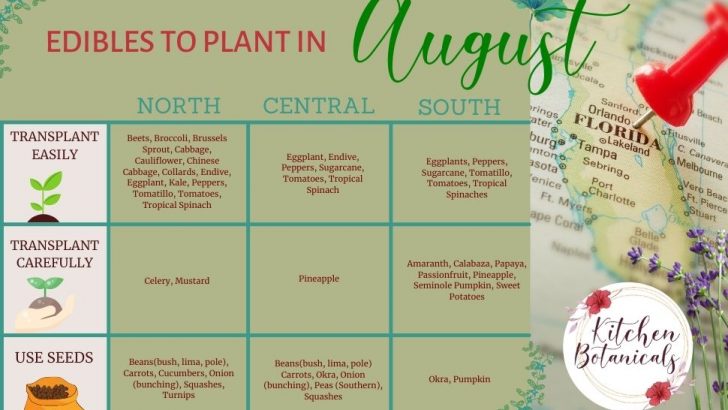It can be hard to know what to plant in August, especially if you’re new to gardening in Florida.
You may be used to planting tomatoes in the spring, but spring is generally too late in Florida. The main growing season in Florida starts in the fall.
Plant vegetables like carrots, onions, beans, and squash in August. These vegetables can be planted now and will be ready to eat by winter.
The main advantage of Florida’s main growing season starting in the fall is that you can grow fresh produce year-round.
With a little bit of care, you can have a thriving vegetable garden that provides fresh, healthy food for your family all year long.
Table of Contents
Pin it for later:

Tips for Gardening in the Florida Heat
If you’re not used to Florida vegetable gardening, there are a few things you can do to make it easier.
First, try to garden in the morning or evening when it’s cooler. You can also put up a sunshade to protect yourself from the harsh Florida sun.
Second, wear thin, breathable fabrics to keep yourself cool. Cotton and linen are good fabrics to wear for gardening.
Finally, make sure you stay hydrated. Drink plenty of water and take breaks in the shade often.

The hot, humid weather in Florida can also be tough on gardens. Here are some tips to help you keep your garden healthy and happy during the summer months:
- Water early in the morning so the plants have time to dry off before nightfall.
- Use mulch to help keep the soil moist and cool.
- Plant heat-tolerant vegetables, such as eggplant, peppers, and tomatoes and choose varieties that are resistant to fungal diseases.
- Try to avoid getting water on the leaves of your plants, as this can promote fungal growth.
- If you see pests or disease on your plants, act quickly to treat the problem.
The University of Florida has also put together a guide for vegetable gardening in Florida.
By following these tips, you can enjoy gardening in Florida all year long.

Can You Grow Vegetables Year-Round in Florida?
Looking to add some fresh, homegrown vegetables to your table? You can do it year-round here in Florida!
With a little planning, you can grow just about any type of vegetable right in your own backyard.
Not to mention, home-grown veggies always taste better than store-bought. Plus, growing your own vegetables is a great way to encourage your family to eat more fresh produce.
Fall is the perfect time to plant in Florida, with ideal weather conditions for plants and cooler temperatures that help with insect control.
Most seeds can be started in August and transplanted into the ground in September or October.
So, get started today and you could be enjoying a delicious and nutritious bounty of homegrown veggies for months to come!

Is It Too Late to Plant in August in Florida?
Looking to start a veggie garden but worried it might be too late in the season? Have no fear!
August is actually the perfect time to get started in Florida. You can plant some veggies outside this month, and also start growing seedlings indoors.
Some great choices for vegetables that thrive in warm weather include eggplant, peppers, tomatoes, beans, carrots, squash, and green onions.
And if you’re starting seeds indoors to transplant during the cooler months, broccoli, cabbage, and cauliflower are all excellent choices.
So don’t wait any longer – get planting today and you’ll be enjoying fresh, delicious produce for months to come!

Can I Plant Flowers in August in Florida?
Looking to add some color to your landscape this fall? Planting flowers in August is a great way to do it!
Here in Florida, we have a wide variety of beautiful flowers that thrive in our climate. A few of our favorites are marigolds, sunflowers, and zinnia.
When picking out your flowers, make sure to choose ones that will do well in the Florida heat. And remember to plant them in an area that gets plenty of sun and has good drainage. Water them regularly, and you’ll soon have a gorgeous garden!
The best flowers to start in August include:
- Angelonia
- Begonia
- Black-Eyed Susan Vine
- Blue Daze
- Butterfly Weed
- Bush Daisy
- Cat’s Whiskers
- Chrysanthemums
- Coleus
- Coreopsis
- Crossandra
- Fire Spike
- Gaura
- Golden Globe
- Heliconia
- Jacobinia
- Impatiens
- Lantana
- Marigold
- Melampodium
- Moon Flower
- Pentas
- Periwinkle
- Porter Weed
- Portulaca
- Purslane
- Salvia
- Stokes Aster
- Sunflower
- Torenia
- Zinnia
When it comes to planting flowers in Florida, there are a few things you need to know.
First, make sure you pick flowers that are compatible with the climate. Some flowers that do well in Florida are lantana, portulaca, and zinnia.
Second, make sure you plant your flowers in the right spot. Most flowers need full sun and good drainage. Make sure you read the labels on your flower packets to find out what kind of soil and light conditions each flower needs.
Third, water your flowers regularly. Flowers need at least 1 inch of water per week, more if the soil is dry. Make sure you water your plants early in the morning, so they have time to dry off before nightfall.
By following these tips, you can enjoy beautiful flowers in your garden all year long!

What Florida Vegetable Seeds Can I Sow in August?
If you’re looking to add some fresh vegetables to your dinner table, August is a great time to sow some seeds! In Florida, there are plenty of options for veggies that you can plant at this time of year.
The south part of the state has a more tropical climate, so their growing season is a bit different than the rest of Florida. However, if you start your seeds indoors, you can still plant broccoli, cabbage, cauliflower, and lettuce.
By taking advantage of the planting season now, you can enjoy a delicious and nutritious harvest for months to come! So, grab your gardening gloves and get started!
In general, you can plant the following vegetables from seed in August:
North Florida
- Beans
- Beets
- Broccoli
- Brussels Sprouts
- Cabbage
- Carrots
- Cauliflower
- Celery
- Collards
- Cucumbers
- Eggplants
- Kale
- Kohlrabi
- Lettuce
- Melons
- Mustard
- Peppers
- Radish
- Spinach
- Squash
- Swiss Chard
- Tomatoes
- Turnips
Central Florida
- Beans
- Beets
- Carrots
- Collards
- Cucumbers
- Eggplants
- Kale
- Melons
- Mustard
- Onions
- Peppers
- Pumpkin
- Radish
- Spinach
- Squash
- Swiss Chard
- Tomatoes
- Turnips
- Watermelons
South Florida
- Beans
- Collards
- Cucumbers
- Eggplants
- Kale
- Melons
- Mustard
- Onions
- Okra
- Peas (Southern)
- Peppers
- Pumpkin
- Spinach
- Squash
- Swiss Chard
- Tomatoes
- Turnips
- Watermelons
If you are starting your seeds indoors, you can also plant arugula, broccoli, cabbage, cauliflower, and lettuce.
By planting now, you can have a delicious and nutritious bounty to enjoy for months to come!

Herbs to Plant in Florida in August
Looking for something special to plant in your garden this August? Why not try herbs? These fragrant, flavorful plants can add a little zing to any dish, and they’re easy to grow, too!
Herbs are a great choice for Florida gardens. They like the same kind of sunny, well-drained conditions that other flowers and vegetables need. Most herbs are quite drought-tolerant, so you won’t have to worry about watering them very often.
When it comes to choosing herbs for your garden, there are lots of different flavors and smells to choose from. Popular options include basil, rosemary, sage, thyme, and mint.
If you’re not sure which herbs to pick, try a few different kinds and see what you like best! Herbs are easy to grow and can be used in so many different ways.
Here is a list of herbs you can start from seed or cuttings in August:
- Anise
- Basil
- Bay Laurel
- Chives
- Dill
- Ginger
- Lemon Balm
- Mexican Tarragon
- Mint
- Oregano
- Rosemary
- Sage
- Sweet Marjoram
- Thyme
So what are you waiting for? Get planting and enjoy the flavor-packed harvest!
Final Thoughts
August is a great time to start planting vegetables in Florida, as the weather is still warm and sunny.
There are many different types of vegetables that can be planted during this season, so there’s something for everyone.
If you’re looking for herbs to add to your garden, August is also a great time to plant them. Herbs are easy to grow and add flavor to any dish.
So, get out there and enjoy the bounty of the August harvest!
